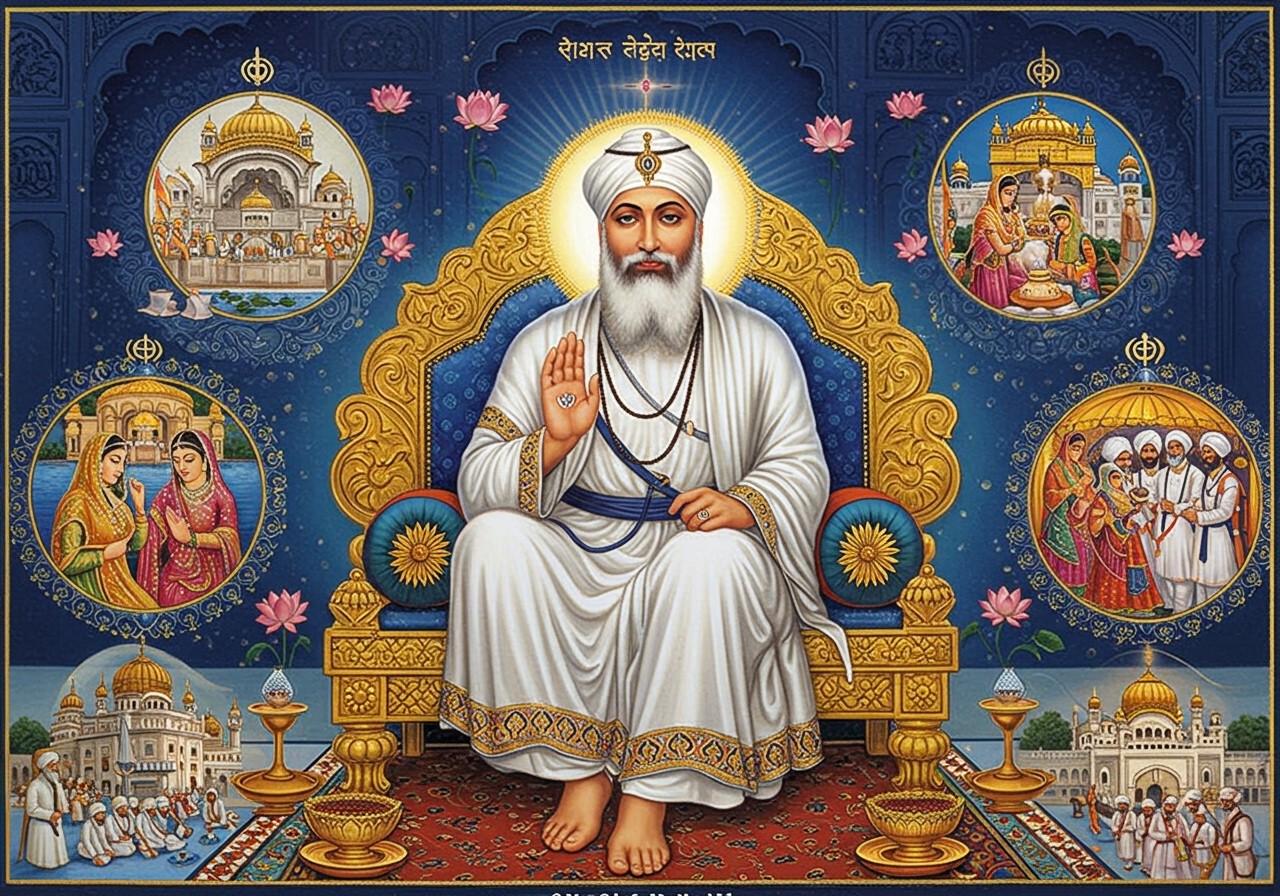
Guru Ram Das Ji, the fourth Sikh Guru, stands as a shining example of wisdom and spirituality. Born as Bhai Jetha on September 24, 1534, in Lahore, his early life significantly shaped the compassionate and insightful leader he would become. Orphaned at the tender age of seven, he was raised by his maternal grandmother in the village of Basarke. This humble upbringing instilled in him deep-rooted values of simplicity, resilience, and empathy.
At the age of 12, young Jetha moved to Goindval with his grandmother. It was a fateful move, for it was there that he encountered Guru Amar Das Ji, the third Sikh Guru. Deeply moved by the Guru’s teachings, Jetha became his devoted disciple. This profound relationship transformed Jetha, setting him on a path of spiritual enlightenment and service.
Marriage and Family Life: A Foundation of Devotion
Jetha’s marriage to Bibi Bhani, the daughter of Guru Amar Das Ji, marked a pivotal moment in his life. This sacred union not only deepened his spiritual journey but also strengthened his connection with the Sikh community. The couple were blessed with three sons: Prithi Chand, Mahadev, and Arjan Dev. Family life played an essential role in shaping Guru Ram Das Ji’s teachings, emphasizing the importance of love, compassion, and unity within the family and the wider community.
Ascendancy to Guruship: A Servant of God
In 1574, Guru Amar Das Ji, recognizing Jetha’s unwavering devotion and spiritual maturity, appointed him as the fourth Sikh Guru. Upon receiving this honor, Bhai Jetha was given the name Ram Das, meaning “servant of God.” He embraced this role with humility and grace, leading the Sikh community with wisdom and compassion. His leadership ushered in a vital era in Sikh history, characterized by spiritual growth and community building.
Establishing Amritsar: A City of Divine Nectar
Guru Ram Das Ji’s visionary leadership led to the founding of Amritsar in 1577. With foresight and divine inspiration, he excavated the sacred pool known as Amrit Sarovar, the “Pool of Nectar,” laying the foundation for what would eventually become the magnificent Harmandir Sahib, the Golden Temple. Amritsar blossomed into a vibrant spiritual and cultural hub for Sikhs, fostering a sense of unity and providing a sanctuary for spiritual growth and contemplation.
Relations with Baba Sri Chand: A Testament to Respect and Harmony
Despite their differing spiritual paths, Guru Ram Das Ji maintained a respectful relationship with Baba Sri Chand, the elder son of Guru Nanak Dev Ji. Their interactions demonstrated Guru Ram Das Ji’s remarkable ability to foster harmony and mutual respect, even amidst differing viewpoints. This serves as a powerful example of his wisdom and commitment to unity within the larger spiritual landscape. It speaks volumes about his character and leadership style.
Legacy and Teachings: A Beacon of Humility and Service
Guru Ram Das Ji’s contributions to Sikhism are profound and far-reaching. He composed 638 hymns, now enshrined within the sacred Guru Granth Sahib. His teachings emphasize the importance of humility, selfless service (seva), and unwavering devotion. He further strengthened Sikhism by composing the four Lawns (hymns) for Sikh marriages, establishing a distinct Sikh matrimonial system. He continued the tradition of Guru ka Langar, the communal kitchen, ensuring that all were fed regardless of caste or social standing. Moreover, he actively spoke out against superstitions and the caste system, advocating for equality and social justice.
Family and Succession: Continuing the Lineage
Before his passing on September 1, 1581, in Goindwal, Guru Ram Das Ji appointed his youngest son, Arjan Dev, as his successor. This thoughtful decision ensured the continuity of Sikh traditions and teachings, paving the way for the further development and flourishing of the Sikh faith. He carefully considered the qualities necessary for leadership and spiritual guidance, ultimately choosing the son he believed best suited to carry forward the legacy.
How Poojn.in Helps Honor Guru Ram Das Ji’s Legacy
For devotees seeking to honor the sacred memory of Guru Ram Das Ji, Poojn.in offers a curated selection of authentic ritual items that align with cherished Sikh traditions. Our pure Gur Batasha (₹30-₹179), made without artificial colors, is ideal as prasad during ardas and kirtan events. This traditional sweet carries special significance, representing the sweetness of devotion that Guru Ram Das Ji so beautifully embodied.
We also offer Nakuldana, a traditional offering used in various Sikh ceremonies. These items are carefully sourced and meticulously quality-checked to ensure purity for your religious observances. All products come with detailed usage instructions for your convenience and are available for home delivery across India.
For personalized guidance on product selection or to discuss bulk orders for gurudwara events, please don’t hesitate to contact us:
- Phone: 03369029784. Our dedicated phone line is open during business hours to address any questions you might have regarding products and services.
- WhatsApp: 9476142738. Reach us conveniently through WhatsApp for quick inquiries and personalized assistance.
Visit www.poojn.in to order these sacred items easily and conveniently. Our customer service team is always happy to assist with any queries about products suitable for ceremonies related to Guru Ram Das Ji.
[Note: Product prices and availability are subject to change. Kindly check our website for the most current rates.]
Conclusion: The Everlasting Impact of Guru Ram Das Ji
The life of Guru Ram Das Ji serves as a guiding light for all those seeking wisdom, spiritual solace, and a deeper connection with the divine. His extraordinary journey, from humble beginnings to becoming a revered Sikh Guru, powerfully illustrates the transformative power of faith and unwavering devotion. By establishing Amritsar, he created not just a city, but a sanctuary of unity and spiritual growth for Sikhs worldwide. His teachings on humility, selfless service, and equality continue to inspire and guide us on our own spiritual paths.
Guru Ram Das Ji’s legacy extends beyond the hymns he composed and the social reforms he initiated. It resides in the spirit of love, respect, and compassion that he so beautifully exemplified. His vision of a harmonious community continues to resonate, reminding us of the vital importance of staying connected to our cultural roots while embracing positive change. As we reflect on his invaluable contributions, we draw strength and inspiration to carry forward his timeless message of peace and devotion.
FAQs on Key Events and Figures in Guru Ram Das Ji’s Life: A Chronological Exploration
Who was Guru Ram Das Ji? Guru Ram Das Ji was the fourth Sikh Guru, revered for his profound humility and unwavering devotion. He played a pivotal role in the development of Amritsar, shaping it into the spiritual center it is today. His leadership emphasized service, compassion, and the importance of community.
What is Guru Ram Das Ji known for? He is renowned for founding the city of Amritsar and laying the groundwork for the Golden Temple, the holiest shrine in Sikhism. He also composed numerous hymns enshrined in the Guru Granth Sahib, offering spiritual guidance and solace to generations of Sikhs. His compositions are known for their depth of feeling and lyrical beauty.
Who was Guru Ram Das Ji’s wife? Guru Ram Das Ji’s wife was Bibi Bhani, the daughter of the third Guru, Guru Amar Das Ji. Bibi Bhani was a devoted companion and played a significant role in his life, offering support and sharing in his spiritual journey. Her wisdom and compassion were a source of strength for the community.
How many children did Guru Ram Das Ji have? Guru Ram Das Ji had three sons: Prithi Chand, Mahadev, and Arjan Dev. Each son had his own unique path, but it was his youngest, Arjan Dev, who would follow in his father’s footsteps. This choice reflected Guru Ram Das Ji’s wisdom and foresight.
What was Guru Ram Das Ji’s relationship with Baba Sri Chand? Baba Sri Chand was the elder son of Guru Nanak Dev Ji, the founder of Sikhism. Though Guru Ram Das Ji and Baba Sri Chand followed different spiritual paths, there was a deep mutual respect between them. This demonstrated Guru Ram Das Ji’s commitment to tolerance and understanding, recognizing the validity of different spiritual expressions. He believed in unity and harmony above all.
Why is Guru Ram Das Ji significant in Sikh history? Guru Ram Das Ji holds immense significance due to his pivotal contributions to the development of Sikhism. He established crucial Sikh institutions, including the city of Amritsar, and emphasized the importance of community service (seva) and humility. His leadership solidified the Sikh identity and laid the foundation for the future growth of the faith.
How did Guru Ram Das Ji contribute to Sikh teachings? He made significant contributions through his soul-stirring spiritual hymns and insightful teachings, which emphasized devotion, selfless service, and the inner journey toward God. His words continue to resonate with Sikhs worldwide, offering guidance and inspiration on the path to spiritual enlightenment. They are treasured for their wisdom and poetic beauty.
What are some key events in Guru Ram Das Ji’s life? Key events include his marriage to Bibi Bhani, which strengthened his connection to the Sikh community; the founding of Amritsar, which became a vital spiritual center; and his invaluable contributions to Sikh scriptures and community practices. These contributions shaped the very fabric of Sikhism.


